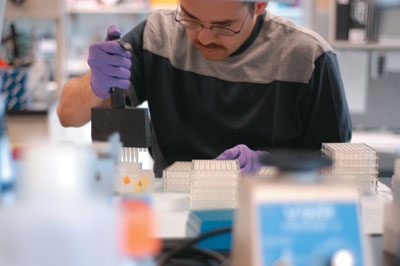Johnnie Orozco Receives Nickens Scholarship
Only five students nationwide received the Herbert W. Nickens Minority Medical Scholarship. UW Medical School student Johnnie Orozco was one of them.
The Nickens scholarships are given to outstanding students entering their third year of medical school who have shown leadership efforts to eliminate inequities in medical education and health care and to address educational, societal, and health-care needs of minorities. Orozco received a $5,000 scholarship and an award certificate. The Association of American Medical Colleges announced the recipients July 28, 2003.

Johnnie Orozco, working on an M.D./Ph.D. degree, researches antibody recognition of viruses that may cause cervical cancer.
"Of course, I couldn't believe it," Orozco said. "I had looked at the Web site and I was amazed at the extent of their [past winners] involvement. I couldn't believe I was one of just five. Then I got on the phone and called everybody I knew."
Orozco is enrolled in the Medical Scientist Training program and is earning a combined M.D./Ph.D. degree, which he estimates will take 10 years to complete.
"It will get me to where I want to be," Orozco said.
His Ph.D will be in bioengineering. He is researching antibody recognition of human papilloma viruses. There are hundreds of different papilloma viruses, and some types cause benign genital warts, while others cause cervical cancer. Even though many types are similar to one another, the human immune system can differentiate the different types. Specifically, Orozco is looking at which portion of the viral shell of human papilloma viruses our immune system recognizes to tell the difference between types. His work can have implications in efforts to develop a vaccine against the cancer-causing papilloma viruses. Orozco chose this area because of the impact it can have clinically.
"I knew that the area of vaccine development is one avenue to take to make a difference," Orozco said.
His research has led him to conclude that it will not be simple to develop a vaccine. Instead of making one hybrid vaccine that includes parts of all cancer-causing human papilloma viruses, a vaccine will need to be made for each type.
In addition to his research, Orozco recruits underrepresented minority students to college and the health professions. About two or three times a year, Orozco travels to graduate school fairs around the country to recruit minority students to health care by talking to them and telling them about programs at the UW.
"By talking to them one-on-one I think it sort of eases their concerns about coming here," Orozco said.
He also serves as mentor to pre-medical students in the McNair Scholarship Program, a program that recruits underrepresented students into graduate schools to pursue doctorates.
"As a mentor you explain to them the process to get there," Orozco said. He points out different programs to take to be better prepared before they apply and how to approach test questions.
As a volunteer at the Health Adventures Program at Swedish Hospital, he worked with middle-school students to encourage their interest in science and in health careers. The students meet once a month to discuss topics in health care.
"The idea is to show them they don't just have to go into medicine to have an impact on patients," Orozco said.
He also is a member of the medical school admissions committee.
"That's also rewarding because you also have a chance to leave a little thumbprint on the School of Medicine," Orozco said. "It's also a humble experience because there's some really amazing people applying."
In the future, Orozco and his wife might go back to California, or they may stay in the Northwest.
"Seattle has kind of grown on us," Orozco said. "We're opening up to the idea of staying."